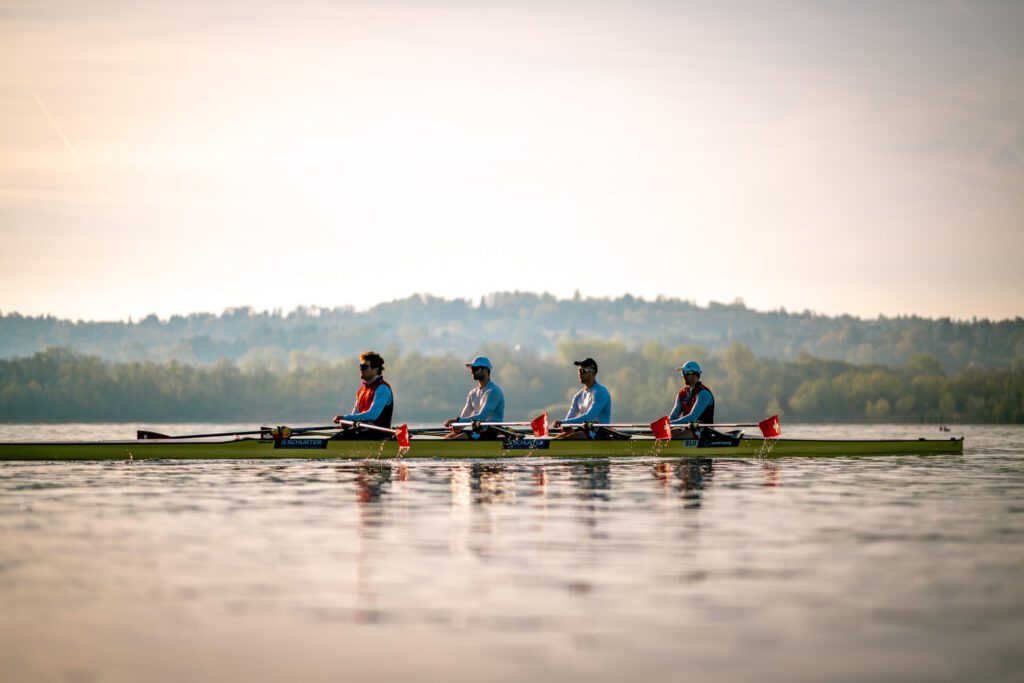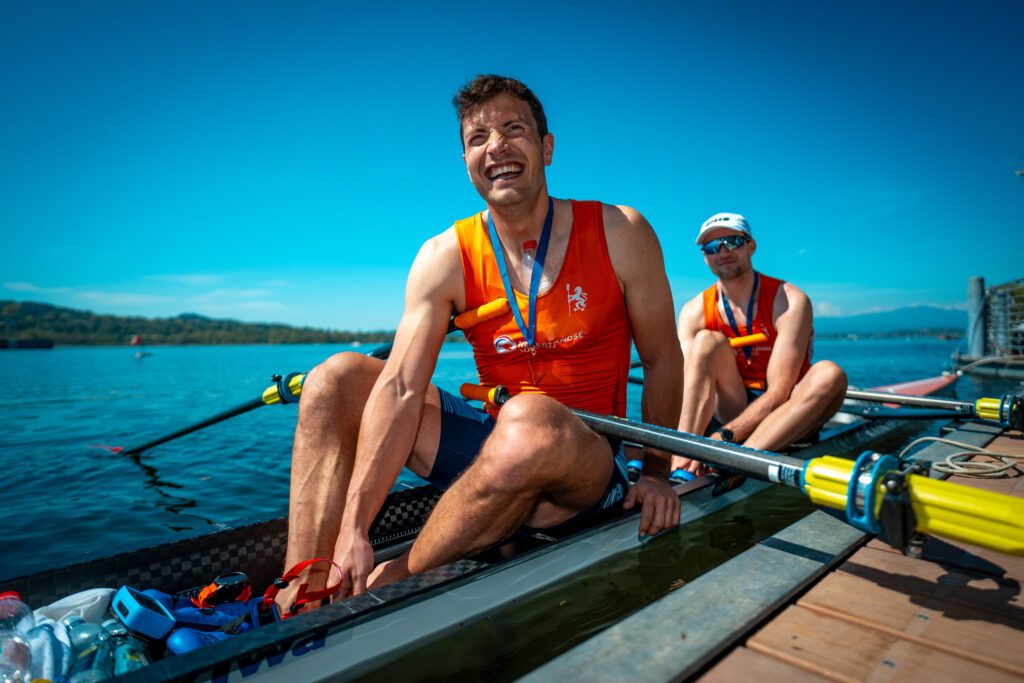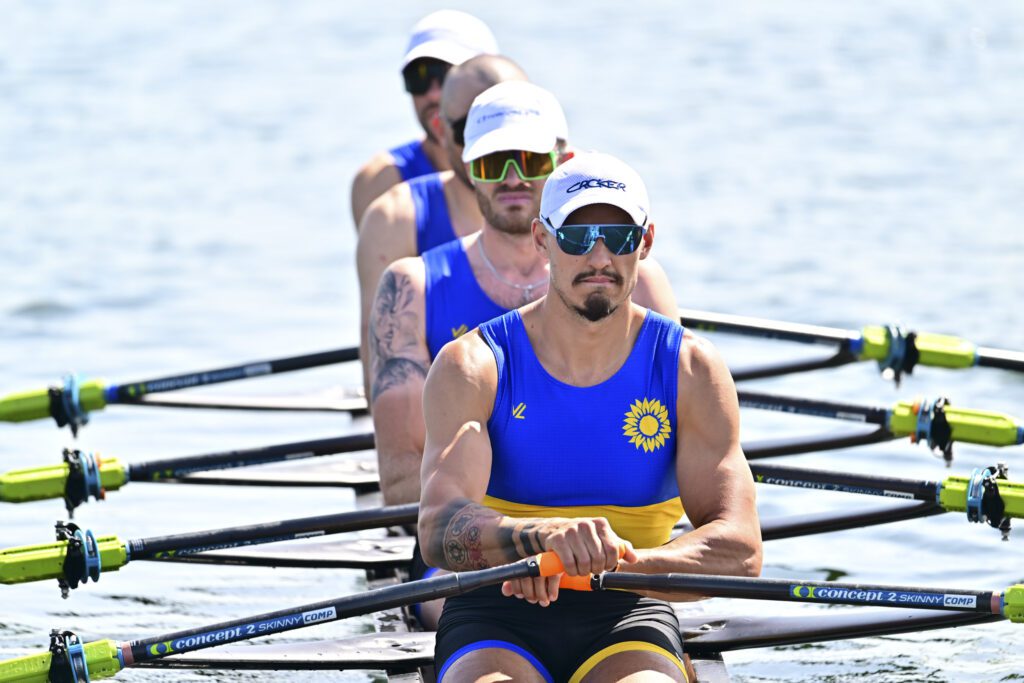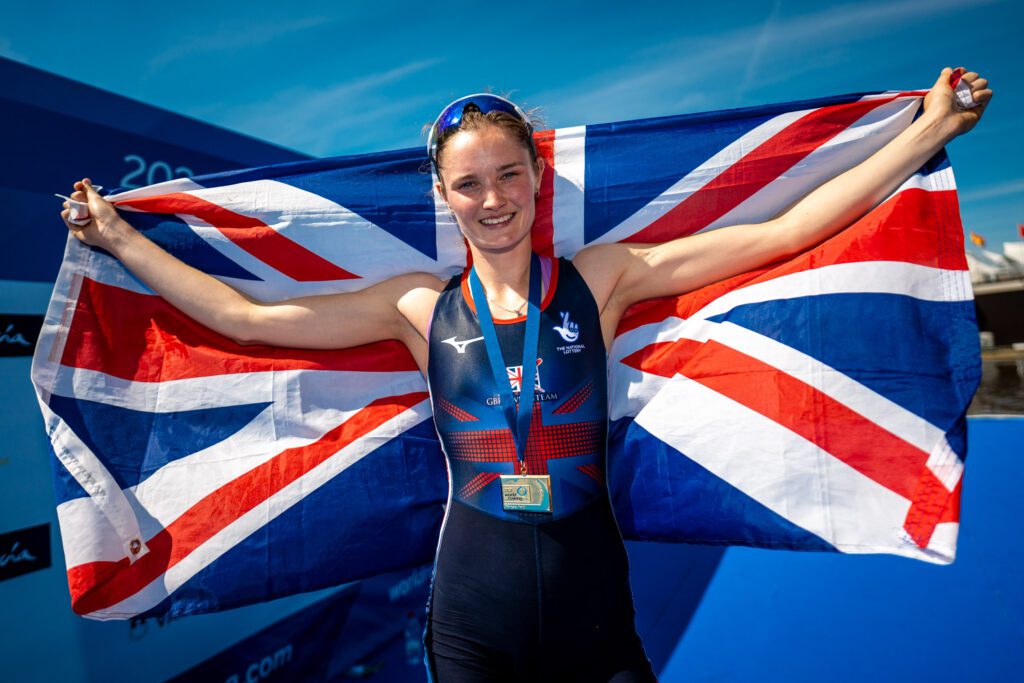London 2012 Team USA Olympian and current USRowing Athlete Representative Sara Hendershot meets USRowing’s new Chief High Performance Officer Josy Verdonkschot.
A physical therapist once told me that many Olympic athletes are elite compensators. He meant that we are incredibly good at performing sub-optimal movement patterns, developing epic strength in those patterns, and then winning races using less-than-ideal skills. When you win using poor patterns, those patterns are reinforced because athletes will attribute their success to those habits. But in many cases, athletes are successful in spite of their compensations, not because of them.
Leadership is the same way. When a leader wins, whether that be in sport or business, their success is often attributed to their methods. Inevitably, their techniques will be copied as others attempt to create their own wins. And while cut-and-paste as a strategy is flawed for its inability to push innovation, it can be downright dangerous if the methods are short-sighted, immoral, or harmful.
We’re currently witnessing an inflection point in sport. The modern athlete is demanding more from their sporting experience and they’re asking for a new kind of leader. They want to compete within systems that promote athlete development, well-being, and sustainable elite performance. They want to participate in engaging dialogue and for their voices to be heard. Most importantly, they are arguing that treating athletes as humans rather than strictly as performers will lead to stronger results.The great news? Research is starting to back this theory not only as plausible, but as integral to maximizing athletes’ potential. Competitive success can be achieved while adopting a caring, holistic, athlete-centered approach1, and athletes thrive when their basic psychological needs are met2. This is rooted in the concept that athletes are not just performers, they are people. And as such, the optimisation of their health and well-being should be highly prioritised.
After 15 years of building my rowing career and reaching the Olympic finals of London in the women’s pair, I’m now sitting on the other side of the athlete experience, as a USRowing Board Member helping to rebuild the High-Performance program. We’ve been compensating for a while now, and it finally caught up with us. USRowing, along with many other national governing bodies, are beginning to change their approach to leadership and athlete needs. This was exactly the intention when we hired Josy Verdonkschot as our new Chief High Performance Officer.
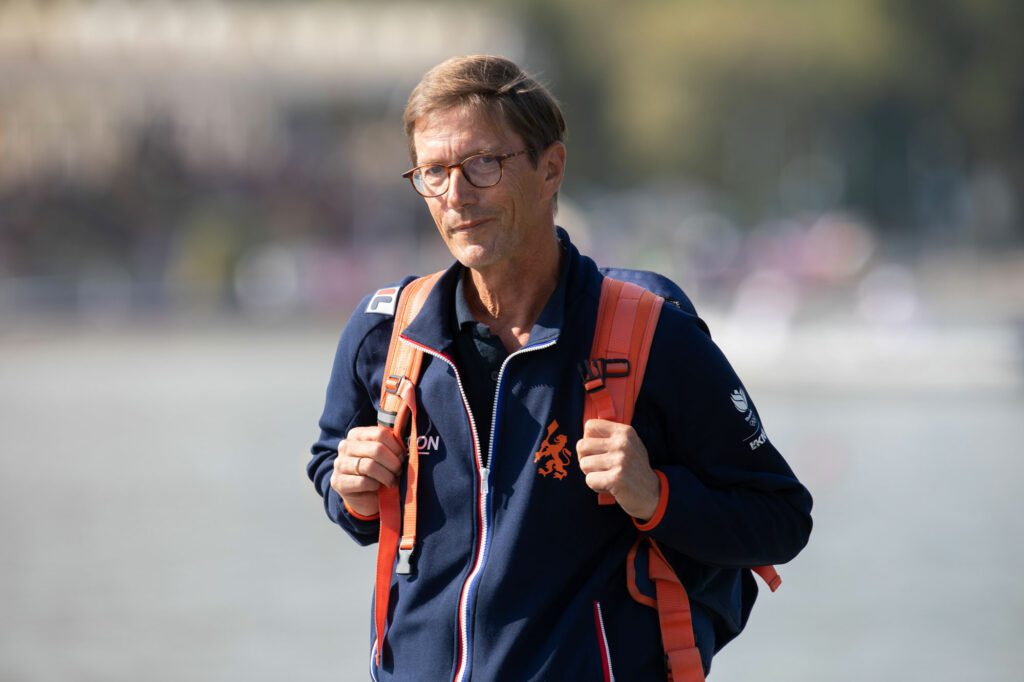
Photo Josy Verdonkschot
Credit Ellen De Monchy
Josy is known for his incredible track record as a coach, most recently for leading the Dutch women’s national team to three Olympic medals in Tokyo. He is celebrated for his ability to holistically guide athletes to Olympic gold despite incredibly challenging situations, like completing their doctoral residency while training, or suffering a rib break just weeks before the Final Olympic Qualification Regatta. Josy has particularly high standards, but looks at every athlete as an individual, and will support them with the tools they need to achieve their goals. He also genuinely loves this process – he is a team builder who enjoys breaking down a challenge and solving it like a puzzle.
So, it was my pleasure to speak with Josy on the podcast, The Swing of Things With Amanda Kraus of USRowing. He shared story after story including Olympic Covid isolation, winning underdog races, how he coaches to overcome setbacks, and why he is excited to come to the United States. It’s hard not to be drawn to his style, especially when he (off mic) persuasively described how I could come out of retirement and still manage my young family. But for all my optimism, Josy asks we judge him by his results, so that we will.
Sara Hendershot [SH]: How did you get involved in rowing?
Josy Verdonkschot [JV]: I’m your typical walk-on. I come from the only place in the Netherlands where there are hills, and you can’t row. I went to university, and I studied in Amsterdam, and I discovered this nice rowing club called Nereus. I basically went there because they had the best parties. That’s how I got caught up within rowing.
SH: Being dragged to the boathouse by a roommate – is a common walk-on story
JV: Yes! By a classmate in my case. He said, “Okay come over”. He put me in a tub (a large rowing boat) and he told me I was great. After getting my blade caught and almost being catapulted out of the boat, I didn’t think that I was so great, but still he was enthusiastic. And I eventually made it to the freshman eight, so I was happy.
SH: As an athlete what were your highlights, what kept you coming back?
JV: Rowing in the Netherlands is a bit different. Most of the important rowing clubs are connected to universities but they are not really part of the same program. The rowing club is more or less a social club outside of university. It is a way of meeting people and having a good time. Like many I tried to a hang on to rowing for as long as possible, in the end I rowed in Lucerne as a lightweight, so I did get some international experience. In the Netherlands it is natural that after rowing for so long you move on and start a job and you also start coaching or become a member of the boat club board for a year. So, I was pursuing a professional career and coaching on the side almost full time. In that way you can give back to your club which was great. I’ve continued to coach since 1987.
SH: You have a fantastic track record and you’ve coached multiple nations and athletes – which races stand out the most?
JV: It’s always difficult as a coach to say what has meant the most to you and sometimes it is an achievement that isn’t gold at the Olympics. In my case I’ve coached the national teams of Italy, Belgium, and the Netherlands. What is most important to me is the feeling that together you find a way to make it work. For instance, when I arrived in Italy there existed a way of thinking that girls were supposed to row until they finished high school but after high school there were three options; study, marry, and/or get a job. According to the standards of the time all three options were not compatible with sport. My challenge was to build a group and keep them in the sport in a way that they could combine rowing with a relationship, studying, or having a job. In my first year I went to the worlds with only a quad and a lightweight single scull. And my lightweight single won a silver and my quad just missed out and got fourth place: it was the best result ever [for Italy’s women]. Creating something like that, it might not have the glamour [in the eyes of others], but for me it was important to see them evolve as a group, and we did that together. Experiences like that make me happy.
SH: I’ve learned that about you; you are a builder, you enjoy the process of building. Is that true?
JV: Yes, I like to build. I’ve got a son and he likes to build too but that’s with Lego!
It’s important to put together a sustainable system, one where people feel welcome and one that helps people to be engaged in the sport but also to be engaged in life. Let’s be honest – sport is important for a part of your life but at a certain point you must carry on. As coaches we must realise that we are just there for one part of somebody’s life, and we have a contribution to make. We can select, select, select, and cherry pick some nice athlete but for the rest we are not involved, or we can build a system that is clear to everybody and one where people enjoy staying in it for a longer time.
Finding talent is difficult, it’s a specialty, but keeping talent is very difficult and even more of a specialty. The importance of retaining athletes and retaining coaches and staff is hugely underestimated. An experienced coach should be able to integrate their coaching with their family and life. We want to keep them. If you’ve got a staff member, yeah, you can have them work sixty hours a week but maybe it’s better if they only work fifty-five and are able to keep the joy in their job. For me, it is all about building a team. I design a system, but I build a team.
SH: That’s really special and it’s something I’m excited to see you bring to our system. Where did that come from? Was there another coach that you learned from who helped teach you some of those processes? It almost sounds like you have a background in psychology!
JV: You do, don’t you?
SH: I do.
JV: I don’t have a psychology background, but I like puzzles, I like challenges, and I like making something work when other people think it will not. Creativity is important, but I apply basic rules and I try to be analytical. I try to use whatever means I have to analyse the system instead of just going through the motions. To be honest, my results are based not upon the right people but by being clever about how these people can get to the right level. In 2016 my women’s lightweight double won gold in Rio, one year before they weren’t qualified, and four months before the Final Olympic Qualification Regatta [FOQR] in Lucerne, one of them fell off her bike and broke her rib, not a stress fracture but a broken rib. She got back in the boat just three weeks before the FOQR.
SH: Wow. I did not know that story.
JV: Okay so we have a setback. The only question I ask my rowers before a race is, “Do you think you did everything you could have done”. The answer should be, yes. If so, you will get what you deserve. If somebody has to sit on the bike for six weeks before the first race, it will be a bit rusty but make sure that you sit on the bike in the right way and do your training. Don’t think about what you didn’t do – people are always explaining what they can’t do. It is not interesting want you can’t do, it’s only about what you can do. Do what you can do, in the time available. Do what you can do, so you will get what you deserve; it is a simple theory. And analysis helps each person to see how they can work best.
I’ve coached many med school athletes who do residencies. They’re in the hospital between eight and six so we don’t try to do two sessions a day. We make a schedule that fits into their schedule. And in their two days away from the hospital it is not about squeezing in three sessions of thirty kilometres because that doesn’t help – that would be overreaching. Be clever, being clever means being analytical and that means trying to find solutions instead of finding trouble.
SH: That Rio story is incredible. To have a boat that goes through the last chance qualifier, qualifies, and then goes on to win gold; that by itself is incredible. But to have a massive injury right before the qualifiers – I’ve never heard of a story that crazy. How did you get the most out of the situation, and that rower?
JV: The rower was Maaike Head. She was a med student. She finished her internships on her residency right before the 2015 world championships, that’s why she didn’t qualify for the Olympics, but I was sure that it was a medal level boat. We made a plan. They had great erg scores in February and then in March she fell off her bike. It was five or six weeks before the European championships and nine weeks before the qualifier.
For the Dutch Olympic committee, it isn’t enough to win the qualifiers, you must also be in the top three at a world cup. Luckily, I had a spare and she was good enough. We worked on the double and they came third at the Varese world cup which was just enough. Meanwhile I set Maaike up doing endurance training on the bike, and she was also using the Dyno. (That is one of my favourite instruments, it’s a pity Concept2 doesn’t deliver those anymore, but I will come to Vermont and talk to them.) We also integrated altitude training. I set up an altitude training unit so she could sit on a bike and do hypoxic training. The only thing to do was an endurance block and work the lower body. I tried to find every solution that I had. I gave her a decent schedule and once she was over her injury, we had about seven days to prepare before they had the first race at the European championships in Germany. We won. And from then on, they never lost a race, all the way to the Olympic final.
SH: From an athlete’s perspective, to pull off a win like that it must be a massive confidence builder. To be able to think to yourself I’ve overcome all these obstacles now I can absolutely press forward and win these upcoming races.
JV: Sure. I’m trying to remember the saying attributed to Winston Churchill, it is something like, “Kites rise highest against the wind, not with it”. Basically, you will not achieve something without a setback. After the mishap our spare sent this piece of wisdom to us.
SV: I know there are some stories you have leading up to Tokyo 2020, and the challenges presented by the Covid pandemic. What did your Tokyo preparation look like, and how did you handle the challenge of an Olympic postponement?
JV: It was a difficult situation for everybody. We came straight from a training camp in Spain. We landed in the Netherlands, and I had a plan to select the Olympic boats in April [2020] but from the day we arrived there were rumours that everything was going in the wrong direction. Three days later everybody was grounded. Step one is always to make a plan. What we did was provide every athlete with an erg and/or a trainer for their bike so that they could train. And we also organised to collect and distribute their groceries. Twice a week they got a package with all that they needed. They could still go out for a walk, but it wasn’t necessary for them to go shopping. In that way they had less contact with people. We gave out small items of weights equipment and provided a special program. Basically, we got back to basics, and we did a six-week block of training. I said, “Enjoy, see you in six weeks”. They worked for six weeks and then we were allowed to come back into small boats. We had zero positive cases in our team.
After they came back, I said, “We know the Olympics might continue as planned but there’s not a big chance, so we will build for six weeks and in that period we will know what will happen – whether we have the Olympics or not we will select the boats”. You must have a target and I try to set targets for short periods. We did four weeks of training, a build-up, and then two weeks selection. And I selected the qualified boats for the Olympics. So, in July [2020] they were selected.
Then I sent them off for two weeks of cycling in any location they wanted. When they came back we knew there would be 2020 European championships. So, we prepared for the European championships and at the regatta we won everything. We won the quad, the straight four, and the light double. It was an amazing result, probably because we had a very structured approach from the beginning all the way to the Europeans which was at the beginning of October 2020.
I said to everybody there are three ways that could see selection reopened; one, if somebody has a lengthy injury and there is a risk that they can’t come back; two, if the boat doesn’t perform at the next important step which would be 2021 European championships in Varese; and three, if one person consistently underperforms in tests. Nothing like that happened, so in a way by giving them security it helped them to focus. The knowledge that they were competing for a medal allowed them a very focused period of preparation and in a way we didn’t notice all the trouble around Covid.
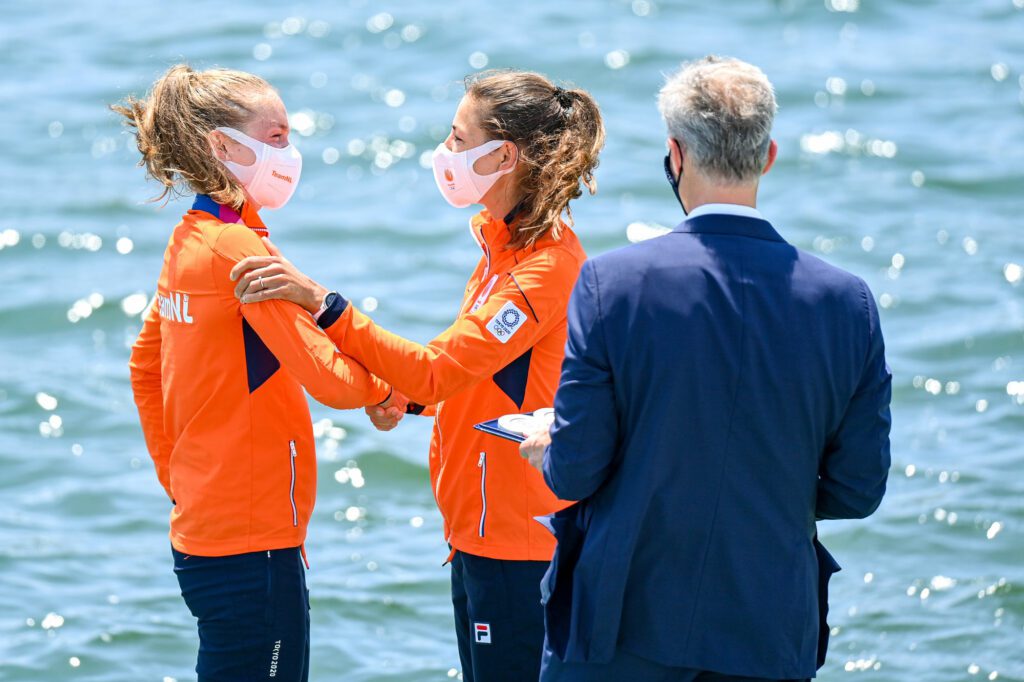
Photo NED LW2x, Tokyo 2020
Credit Steve McArthur
SH: That’s interesting and very different from what happened to the US team.
JV: In a way it’s challenging because your span of concentration is impaired by a period that long. It’s difficult. You must set intermediate goals, and you must have a plan that clearly shows when we need to perform, and when we don’t need to perform.
We still had people who weren’t qualified and generally they weren’t in the top of my group, so I opened up selection for all the non-qualified boats. In that way I created room for new entries [athletes] and that group is still there – we retained them all. We retained them because we opened up and because we said you’re the group heading to Pairs 2024. You need to have short-term and long-term goals. People need incentives not just to keep them from sitting back but also to feel confidence in what they are doing. I think all my athletes felt confident when they went to Tokyo. But I can tell you I’m not satisfied with the results.
SH: Really?
JV: We won three medals. Three medals was my prediction. And in total with the men, we had five medals which is a great result as a small nation, but the medal count is not interesting. You should look at every crew individually. The medal count is like statistics and statistics are never right, it’s an average, we don’t look at averages.
My heavy double, I predicted would be third and they were third. I think they did a really good job and I’m proud. My straight four should have had a little bit more confidence that they could win. They challenged and, in the end, it was only two tenths but if you look at the race, they were not challenging in the last 200 metres, the speed was even. My quad should have medalled, there is another story that we will tell later but that was not their race. I’m not used to my crews not doing their best when it counts. And my light double I accept because they were the best and there was a mess up two strokes before the finish, but they showed in that race that they were the best. So that bronze, I accept. It’s sports and you have mess-ups. They were totally prepared. But my quad and my straight four I’m not satisfied. There was a little extra complication.
SH: Yes, talk about that extra complication.
JV: Although none of us tested positive before we arrived in Tokyo, a few days after arriving one person from the Dutch national team tested positive, and then another, and then another. They were all on the same flight, so it was probably connected to the flight. And then one person in our rowing team tested positive – that was number four – and after our single sculler tested positive, I tested positive.
I was at the rowing course until the heats on Sunday. On Sunday evening I was transported to the Covid hotel in the Olympic village, and I was retested again before being sent to a separate isolation hotel. I was totally detached from my athletes which is not a problem because one of my philosophies is – you’re ready, it’s not me, you’re going to do it.
So that was me. And then the races were postponed, and we had two days with no races. Then my assistant coach tested positive, and she also came to the isolation hotel. We had a team of five coaches. I was mainly responsible for the light double, straight four, and quad. And my assistant was responsible for the double. So, my sweep coaches were still there but there were no more sculling coaches.
SH: How did your athletes respond?
JV: They responded great. Everybody says, “You did everything possible” [to avoid getting Covid] but from that moment on I had one fear; that one of my athletes would test positive. You can imagine their state of mind when my assistant went away, there was nobody left for them to turn to. Every evening around midnight the test results would be delivered and until they got that message, that it was negative and okay tomorrow you can race, it was impossible to sleep.
SH: There must have been so much anxiety around that.
JV: Yes, but they performed great. There was only one thing I regret. Many coaches like to shout, I don’t shout. I watch the race. If it’s a heat, rep or semi-final I might still learn something, but for the final you just watch, but there is one moment after the final that’s important and that’s when they come back into the dock. And it is important not for the people who have won, because when you win you’ve got many friends, but it is important to be there in this case for my quad and my light double: for me, that was the part that hurt.
The rest of my isolation was fine. I met an American pole vaulter called Sam Kendricks who had also tested positive. We were not allowed to mingle but he brought us coffee every morning. We set up a sort of ritual for breakfast, lunch and dinner. We had fun. When you get a test result you get a value and we created a sort of ranking as to who was the most positive each day, and we awarded cookies to those people with the highest score. Things like that kept up morale. And I could still speak to my athletes via Zoom. But I couldn’t give them all the peace of mind I wanted to.
In the end I’m not the one pulling. I’m careful when I speak to my athletes. I always say, “It’s not me, it’s you”. So, in a way, Tokyo was the proof of the pudding, and they delivered, so that’s great.
SH: It was such a unique Games. I doubt there will be another Games like Tokyo, but it sounds like you did a phenomenal job empowering your women, enabling them to take their destiny into their own hands, and control what they could control.
JV: Correct. And that’s what you should do, and that’s what we should teach. It was not just the women; our men did a great job too. You can’t change the environment, but you can adapt, and you should do whatever you can under those conditions.
In Beijing 2008 I coached another lightweight double who also won the Olympic gold after qualifying at the last chance qualifier. It must be a tradition. Perhaps I can predict that in Paris 2024 we win a gold in a boat that comes through the last qualification.
For Beijing 2008 I was also coaching Belgium’s men’s single sculler, Tim Maeyens. He’s a small guy; around 82 kilos and about six foot and a bit. He drew a tough semi-final. One of his opponents was Marcel Hacker and he also had Olaf Tufte in the same race. We made a place to focus on Hacker. I said, “Hacker is better than you but you can break him. It’s very simple. I cannot tell you to go out faster because it never works. It doesn’t work like that, but what you do is just row a decent race and try and stay in contact. Then at 1400 meters we start”. So, at 1400 meters he went. And he was overreaching but Hacker thought that Tim was faster, so Hacker resigned. Tim got into the final and in the end he finished in fourth place, just behind Mahé. So, he got more than he deserved, but that’s because the other guy didn’t take what he deserved. Hacker let the environment influence him. You shouldn’t do that.
SH: Another example of controlling what you can control.
JV: Everybody who comes to me and says, “Okay we have to go 110%”. I always say, “Forget it. If you get up to 100% that’s the maximum you will ever do in your life, and most probably you will not manage it, but that’s what you aim for. Just do what you can do”. I must give athletes the confidence that they will reach their potential and they don’t have to be afraid because I don’t ask for something special, I just ask, do what you can do.
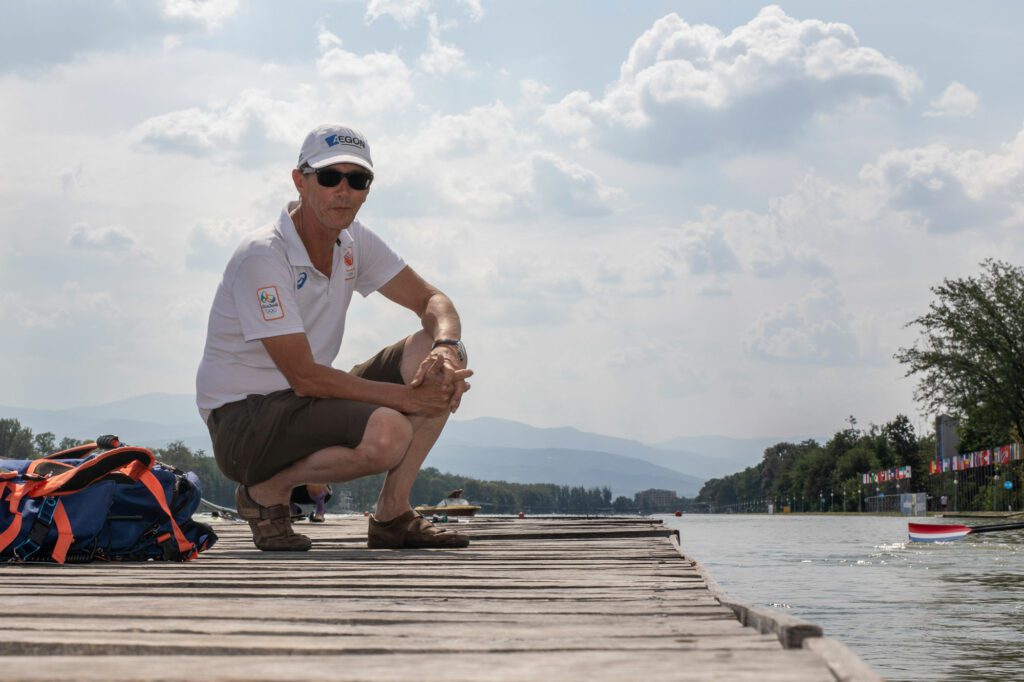
Photo Josy Verdonkschot
Credit Ellen De Monchy
SH: You have a lot of great lessons to bring with you to the United States. You’ll be filling a different role here than any you’ve had before. What drew you to this role as USRowing’s Chief High Performance Officer?
JV: Rowing in the United States is impressive. Look at the depth of the college programs, the history of the clubs, and don’t forget the United States is still leading the Olympic all-time rowing medal tally. There’s so much history and still the US has a high potential to do more, but there’s so much against taking advantage of what you can do. How to allow the high-performance clubs and the colleges to work together in a way that offers opportunities to everybody? How can we have a centralised system in such a huge country? Should we have a centralised system in a country that is this huge? How can we empower everybody in a way that we offer opportunities to athletes but also safety? If they want to commit to rowing over the long term, then there should be support and not just funding but supporting athletes to combine their jobs with their rowing. And to integrate their studies with rowing, and to integrate their families with rowing. I’ve coached mothers who have returned after giving birth. I coached one mother to the Olympic gold. She won a bronze medal in Athens, became a mother in 2005, and in 2008 she won the Olympics. How is that possible? Simple. You make a plan, and you stick to it. This is why it’s interesting to come to the United States because I think I can help. In the end I want to be judged on my results and I’m not just talking about medals because medals are for the athletes. I want to be judged by the progress we make in the support and in the system created.
SH: What are you anticipating the biggest challenges to be?
JV: Nice question. The biggest challenge is to be clever enough to be constructive instead of destructive. What is in place? We’ve got a training centre, Princeton. We should empower the training centre. What’s in place? We’ve got high performance clubs. How can we help those structures to bear fruit? There’s so much knowledge in the United States. How can I integrate the college kids in the system? I must create a structure that is open and one where we can speak to everybody. I must find a way to communicate with people. I don’t need an ivory tower and I don’t need to bring everybody somewhere where they don’t want to be. I must be clever and use all the funding and all the resources that we have and together create the conviction to create bubbles and empower structures. And do it in a natural way, not imposed from above but created from below, together with the people that are there. Look at the US college system. Why are you the best feeder system for all the nations in the world? Look at the number of people recruited from other nations that took part in the Olympics and how many medals they got. You could say, “Maybe we shouldn’t take so many foreigners”. No, that’s not true.
SH: You don’t think that’s true?
JV: No. If you take the best athletes from other nations, then use them to teach, and use them as an example. Why shouldn’t a college coach be allowed to recruit the best athletes? Take another sport like soccer in Europe. Salary inflation in club football meant all the foreigners were going to Spain. In the end Spain became the best national football team because their system is filled with talent from other countries, and they benefit from that. You must find a way to take the lessons from those athletes and find a way to see what makes the difference. We must model our youth system in a way that brings kids up to a level where they can compete with the juniors drafted from other countries. We have good races at the highest level in the IRA and NCAA. We must learn lessons.
SH: I love that. So, having foreign athletes within the US collegiate system is going to elevate the American athletes. That’s a great perspective.
JV: It should.
SH: As an athlete representative it is refreshing to hear how you seek to empower and involve athletes in the process from an early stage. What does success look like for you outside of the medal count?
JV: Building a sustainable system. I don’t value myself on the medal count. I know the outside world will, so we must have results and results are important to the athletes too but for me it would be a success to bring a full team of athletes to the Olympics. And for those athletes to compete in the finals – so top six at the Olympics. That’s eight to ten boats reaching the top six in the Olympics, plus retain 75% of those athletes for LA 2028. For LA 2028 we must up the count. It should be the result plus one, every year. Every year plus one medal, and plus one crew in the final. Getting medals at Paris is one thing but taking 75% of those athletes to LA 2028 would be even greater. I would see that as an aim and a measure of success.
SH: Do you have strategies in mind for how you’re going to retain talent and build on success year-on-year?
JV: I would be rather cocky if I were to say I know it all. I think we must look at the context. I must take time to learn the specifics of the US system. Of course, I have strategies, but it’s not one-size-fits-all. It’s not a factory suit, it’s handmade. I must take time to listen, which I’m doing. Obviously, I must produce something but still I’m listening. I intend to make a tour around America to speak to the key stakeholders and not just on the East Coast or West Coast, not just San Francisco, Oakland and Boston, but also, I want to be in Seattle, Florida, Texas, and Oklahoma. I must have a plan to visit all those clubs and major universities. I want to get a better idea by meeting and talking to people. Then we can build. First, we listen, then we make a plan together. That way it works. If I make it and it’s imposed from above then it won’t work. If people have the feeling that, “Yeah this guy’s not totally stupid,” then that is good.
SH: I love all of that. I’m excited for these club representatives and coaches to meet you. If nothing else they will get a real kick out of your dry sense of humour!
This interview is an abridged extract from Episode 10 ‘Welcome Josy’ on the podcast series, ‘The Swing Of Things With Amanda Kraus of USRowing’.
